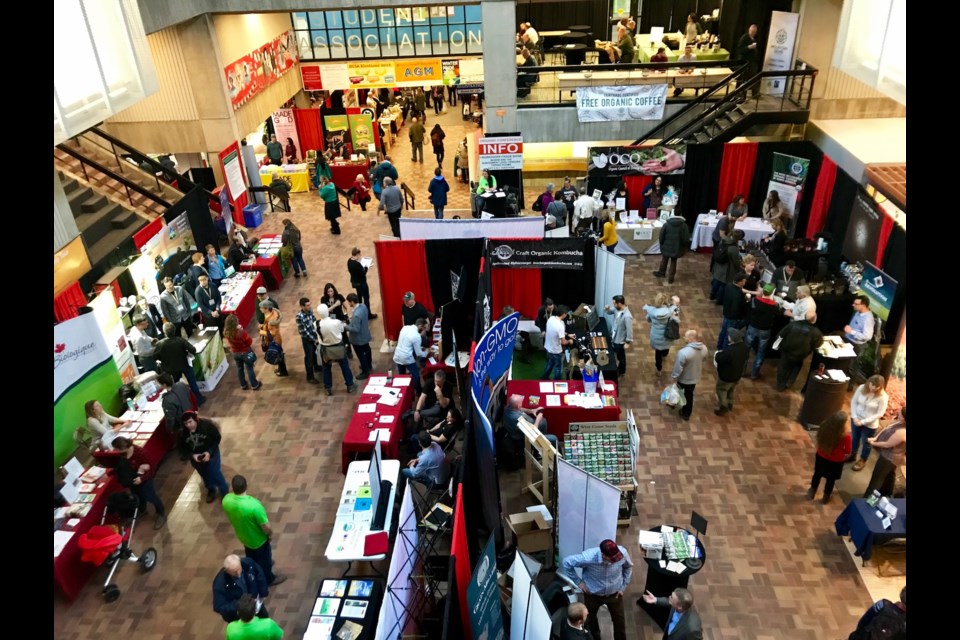Every January since the early 1980s a growing number of organic farmers, manufacturers, merchants, researchers, students, educators and consumers have gathered in the University Centre at the University of Guelph for the Guelph Organic Conference.
“We’re heading into our 40th annual,” said conference advisor Tomas Nimmo. “The conference is unique because it is a gathering point. It is not a Guelph conference. It is not an Ontario conference. It’s a national conference.”
The Guelph Organic Conference started in 1982 as a single afternoon seminar organized by Guelph Ag Alternatives, a group of grad students from the U of G and in 1992, a coalition of non-profits assumed control. It grew slowly each year for nearly two decades until the early 2000s when interest and demand for organic products increased dramatically.
The conference and trade show now fills the main floor of the University Centre and Peter Clark Hall in the basement. It attracts people from far and wide to market their wares, share their experience and learn about the latest developments in the expanding organics market.
It has been organized and promoted by a federal non-profit corporation, Organic Food Conferences Canada, since 2003.
Nimmo has been active in the organics’ movement since the mid 1970s and has been a conference advisor since 1988.
“We are looking at something that took years to evolve,” he said. “I’m not sure this show could ever have evolved the way it has other than at a place like the University of Guelph. Where do you get a building like the UC that can take 150 tables and spread all through a building with enough workshop program rooms within a very short walking distance that will let you run literally 1,000 people across all of these workshop rooms?”
The growing momentum in interest and involvement in the organics’ movement gave organizers every reason to believe this year’s conference would be even bigger and better but their optimism was tempered by the resilience of the COVID 19 pandemic.
“We knew, as of April 1, that the thing was kind of on the edge,” said Nimmo. “We’re a non-profit and the board said, ‘What’s the point of spending thousands on marketing and find out in November that you can’t run.”
Rather than cancel everything outright they decided to look at some of the issues that are important in the organic marketing sector and organize a series of online seminars.
“We went to the non-profits that are sitting on our management committee because there are 16 different groups that kind of, informally, run the show with a board of directors and contractors,” said Nimmo. “The other thing we said is, ‘Let’s make the seminars free as long as people take the time to register so we know who they are.’”
They put together five free seminars that run from Tuesday, January 26 through Saturday. January 30 and posted the schedule and registration information on their website. https://guelphorganicconf.ca
“The Guelph Organic Conference has a huge mailing list of people that attended over the years and I sensed that there was a pent-up demand for what we are providing,” said Nimmo. “We put the bulletin out and had 1,000 opens in the first 36 hours.”
The seminars are hosted by local, national and international experts and cover topics that range from biological farming, transitioning to organic farming and organic seed production to certifying and marketing new organic products.
“One of the issues that is always coming up is, ‘How do I certify textiles and cosmetics, blue jeans and stuff that is not in the Canadian standards?”, said Nimmo. “That is why you see certifying non-food products for the Tuesday and product development for the Wednesday. One of the speakers on the Wednesday program, which is ‘Preparing your product for organic certification,’ is Guelph resident Ben Cullen of Cullen Foods, who launched an organic product in the last 18 months.”
The free seminar series wraps up Saturday with a legend in the organics movement Gary Zimmer, Founder and Chief Visionary Officer of Midwestern BioAg.
“We have tried to get this guy for a couple years and because of his travel schedule and being from the Midwest, he couldn’t come,” said Nimmo.
Zimmer is known as the father of biological agriculture and has written three international best-selling books on the topic.
“Sounds like he has been around for a long time and I am sure the hour and a half will go by like crazy because he will talk the whole time,” said Nimmo. “So, that, we believe, will attract, maybe in our wildest dreams, well over 200 people.”



